"Get a car. Get a house. Get a baby." The Weird World of China's Single Momfluencers
As legislation around children born to single mothers has changed, so have attitudes. Should the CCP embrace this trend as a birthrate Hail Mary?
This is the one that really struck me. In an innocuous post from Moly’s Substack – required reading if you want to stay hip on China – a thread of Weibo comments discussed the best strategies for becoming and surviving as a single mother. Seriously, you have to read it. Even by modern western standards some of this stuff is… out there.
This one thread flipped everything I had ever read about single motherhood in China on its head. Years of news and academic research has reported that single mothers in China are the most disadvantaged demographic, facing barriers like not being able to register their household, a necessity for school attendance, not being allowed to access IVF treatments, not being given maternity insurance or paid maternity leave. This is to say nothing of the general social stigma attached to single motherhood which – while not illegal – can end up inviting a number of embarrassing questions when attending pre-natal appointments.
But here was a new group of women, in their late 20s to early 30s, not only espousing the benefits of single motherhood, but sharing strategies on how to get a smart kid from a decent looking guy:
Not only that, some ingenious members of this group had managed to turn their status into a lifestyle, garnering huge followings on social media and becoming influencers on the same level as makeup gurus and GRWM girlies from the 2010s. They had taken the idea of being an influencer – or ‘momfluencer’ if you will – to a new level: “You don’t need a man to have the life of your dreams; if you want a good house, a decent car, and a child you can love, then go out and get it yourself. Follow me for more tips.”
As a mother with social media, I am more than familiar with ‘momfluencer’ trends and the subcategories they fall into than I’d like to be. For my 90% male audience, here’s a very brief overview of the major western (mostly North American) parenting styles that one can adopt from online peers:
Crunchy moms: A holistic method of parenting. No additives, no preservatives, no shoes. Sometimes no vaccines too, depending on the strain of crunch.
Silky moms: Opposite of a crunchy mom. Will use modern efficiencies and technologies to the bitter end, even if it means their children need a screen just to get through their turkey dinosaur dinner.
Tradwives: Cosplaying the image of a non-existent propaganda poster of a 1950’s American housewife minus the prescribed tranquilisers. Prominent examples include Nara Smith and Hannah Neeleman.
“Wild birthers”: Exactly as it sounds. No medical interventions, no doctors appointments, just rawdogging the amazing experience that is pushing a 9lb human out of a 10cm hole for every woman with 0 complications whatsoever.
Oversharers: Often dubbing themselves ‘family channels’ these are usually female-led Youtube or Instagram accounts (though occasionally they are run by the dad) that are intent on sharing every single one of their children’s experiences. From first steps to first poops on the potty, crying pre-teens to tantruming toddlers, there is nothing these parents won’t put on a screen for likes and engagement. Many of them will be in prison in the future.
While single mums exist, they are not really a category unto themselves, but more a subcategory of influencer. In fact many of them started off as family channels, but as their relationships fell apart (nothing to do with the relentless pressure of social media post schedules I’m sure), they fell into a more self-pitying, sponsored-post, day-in-the-life category of influencer, rather than actively promoting single motherhood as a lifestyle choice.
But this is exactly what the single mothers of China are doing; defiantly stating that not only is single motherhood absolutely fine, but it is in fact preferable to the alternative. They’re the living embodiment of the late-90s-early-00s girlboss who can pick and choose what aspects of life she wants, and discard anything that feels burdensome or undesirable. Think Rachel from Friends or Miranda from Sex and the City – both had babies out of wedlock, not because they had been abandoned by their men, but because they were free-loving, sex-positive women who operated on equal terms with men, and had their children because they wanted them and could raise them alone.
I actually know a few women like this in my own life, aunties and cousins who, in their late 30s, tired of the dearth of good men in their lives, decided to just go ahead and start families themselves. Actually the story of my own birth isn’t too dissimilar. My mother found out she was pregnant after ending a relationship and decided to keep me, feeling that she was capable of raising me on her own. She had a decent, stable job, a flat in zone 3 London, and enough friends and family to maintain a decent social life despite the impending market crash of ‘92.
Being a black single mum of a mixed-race child in the 90s certainly had its challenges. She often tells the story of how she had to face down a school administrator who had repeatedly tried to put me down as ‘English as a second language’ because my mum is ‘foreign’ (as a degree-educated Nigerian woman she speaks better English than most of us, trust me). But my mum was – is – fierce and determined. She knew exactly what she wanted for herself, and therefore for me. When she did choose love and a traditional family set up it was much later, and on her own terms.
And this is exactly what China’s new wave of single momfluencers are promoting: you can have your career and your baby and the life that you want, and you don’t need a man to get it.
What’s changed
Before we dive into the momfluencer world, a brief discussion of the changes in modern legislation as well as attitudes to marriage and family life in China is necessary. First of all, its worth saying that having a child out of wedlock is not technically ‘illegal’ in China, nor is trying to obtain benefits while unmarried legislated against. However, it’s one of those things that even if it's not written down as illegal, it’s also left up to the whims of local officials to exercise their petty powers for or against you depending on their own interpretation.
In 2022, Liu Juan, an official at the National Healthcare Security Administration announced that local governments could not ask single mothers to provide marriage certificates before claiming maternity benefits. Changes to the national policy were made in August that year to reduce the paperwork burden for families in general, which also benefitted single mothers. Later that year, Hechi, a city in Guangxi province, announced a change to the law to exclude the marital status of women when applying for maternity insurance.
Single mums have been driving part of the change, setting up groups and advocating for singles’ rights, including access to fertility treatments for women who want families outside of marriage. It helps that the majority of single mothers – whose children make up around 1% of the population – are well educated and earn an average annual income of 17,000 yuan ($2,338), higher than that of dual-parent or single-father families.
It seems, then, that being a single mum is certainly easier than it used to be, with more recourse to injustice and less social stigma attached to the label. But as research points out, many women still feel uneasy about their choice or unfortunate circumstances:
In the film “Her Story,” when Wang shares her story as a single mother online, it sparks widespread criticism. Similarly, in real life, single mothers also often encounter unfriendly treatment based on their family status. In the Jiemian News report, Ding recounted how coworkers questioned her need to leave work early to pick up her child, citing her single-mother status. Teachers at her son’s kindergarten also attributed his behavior — whether too mischievous or well-behaved — to his family background.
According to the CAMF research, more than half of single mothers are hesitant to disclose their single-parent status, mainly out of fear of judgment (64.6%). Their concerns become even more pronounced when it comes to revealing their children’s family background. The main worries include potential perceptions of their children as flawed (50.5%) or the risk of peer bullying (37.7%).
So what exactly are the benefits of single parenthood that these lifestyle gurus are promoting? And what do their target audience – young women choosing between traditional married life and a brave new world of fabulous motherhood – have to say in response?
Boots on the ground: the world of China’s single momfluencers
Where else can you go for raw data on Chinese social trends than Xiaohongshu (RedNote)? Using the keywords 未婚妈妈 (weihun mama, unmarried mother) and 单亲妈妈 (danqin mama, single mother), I spent a week following, watching, reading and liking hundreds of posts on RedNote from influencers big and small whose identities revolved around being single mums. I was interested both in their message and the responses they were getting, and boy did I find out.
For context, these women can be divided broadly into two sorts of camps: the ‘momfluencers’, proper content creators who make videos we’re used to seeing from regular influencers but with their children peppered in, and ‘normies’, regular mothers sharing their stories, including highs and lows, and giving advice. Again, they can also be divided further into subcategories; some of these women had been married before and decided to get divorced, while others had skipped the marriage route entirely and gone all in on having children alone.
I use normie here not as an insult, but to denote someone who provides an authentic view which is reflected in their comments section, with commenters often being encouraging, empathetic, and asking for genuine advice. They’re also more likely to show the negative sides of being a single mum, or use contextual language or imagery to show themselves overcoming certain difficulties in their day to day lives.
The account “Everyone calls me Dabao” shares a realistic daily life video for a normal single mum. Some of the subtitles allude to the sadness and loneliness she sometimes feels, as well as struggling to build herself up after being broken down.

The influencer videos are more consumable and, to a lesser extent, more enjoyable. The content tickles the part of the brain that really aesthetically pleasing content scratches, and puts being a single mum in such as positive light that even the captions reading ‘being a single mum isn’t easy’ do nothing to deter you from wanting to try it for yourself.
The account ‘Doreen’s mother’ is probably the perfect example. Going back through her earlier profile, she seems to have been a normal influencer account before suddenly appearing with a mixed race baby, without any sort of pregnancy announcement (which has led some to speculate whether or not she had the baby herself). Her content mainly consists of her posting pics of her holding and interacting with her child in her glamorous high rise apartment, videos promoting diet supplements and workouts in full makeup, and diaries of travelling in her own compartment on highspeed rail just days after giving birth (if indeed she did give birth, but this isn’t really important).
In case you weren’t aware, renting an entire sleeper carriage to yourself is not something people can normally afford to do..
Doreen’s mum explains that she wants to stay in shape for her daughter, which is much harder to do when you get older. Which is why you too should buy FANCL supplements!
On the more extreme end we have accounts like 周芳芳芳 (Zhou Fang fang fang), whose posts seem to be a little less about being a single mother to a precious baby, and more about how to be beautiful while pregnant and how to get back to being a size zero as soon as possible after giving birth. Her content is sometimes bordering on the ridiculous – often child seems more like an accessory or a way of promoting weight loss methods or changing tables, and she never fails to put the fact that she’s 41 in bold letters in every thumbnail. But there’s still something desirable and aesthetic in her lifestyle, which contains the broader message that you don’t have to give up who you are after you become a mother, and encourages others to remember that.

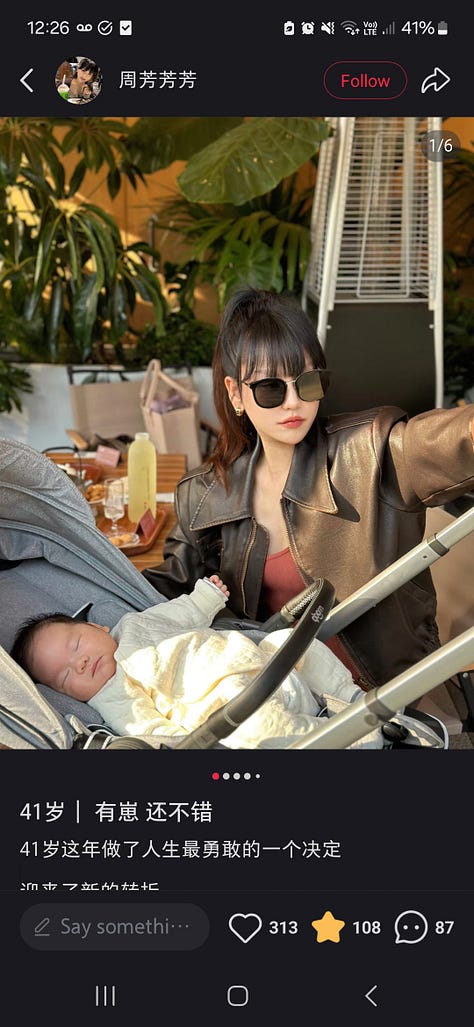

She also gives fairly solid advice as to what’s necessary for this lifestyle in her posts, providing practical pointers for aspiring skinny mums: a village, a stable mindset, and a healthy bank account. As a mother, that’s a message I can get behind.
A key feature of many of these posts are the supportive families, mothers and fathers pitching into help their daughters, and in some cases even moving into brand new shiny apartments together to help raise this joyous new child. It would appear that attitudes towards single mums among the older generation are shifting, as the demand for grandchildren supercedes the desire for a married daughter. I can’t find it now but I did come across one comment from a frustrated mother who lamented that she was done trying to set up her daughter, as high quality men are hard to come by, and would rather she just had a baby like the young woman in the video.
Zeng Kele shows of her new apartment which she shares with her parents. She wonders whether she should buy some new furniture for the place.
There’s more than a little bit of a mixed-race fetishisation, but that might just be me being sensitive as a mixed-race person. Chinese women still don’t have access to IVF at home, so often have to go abroad to even get pregnant on their own. We’ll just gloss over this conversation for now, as I’m not even sure what the proper take would be here.


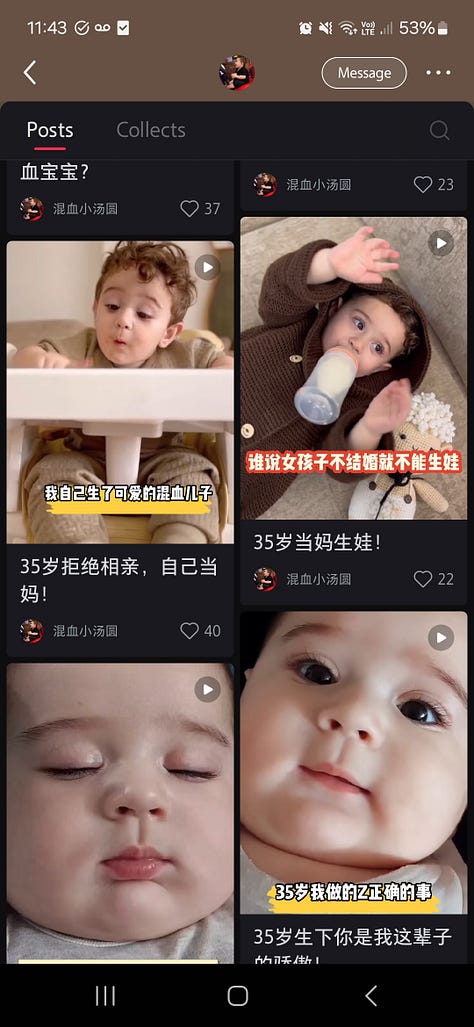
However, the main theme running through these videos is the importance of being prepared, especially on the financial front. Financial independence and a good job – not just to support the baby but to support oneself, maintain happiness and comfort after life changing decision – are the foundations to being a successful and happy mother who doesn’t have to take on any of the critiques of society. If they ain’t paying your bills, pay them no mind.


Over time, it became clear that what these women fear the most is ‘married single-motherhood’, another internet phrase that’s spawned over the years to refer to women who are ostensibly married but still take on almost all of the childcare and household responsibilities. This is more common in patriarchal societies like those in East Asia where women are expected to give up careers and aspirations and become subservient to the demands of their husbands and inlaws. It’s also a totally rational fear, one that many women around the world have either observed or experienced themselves.
The downside
OK, let’s be real for a minute. Most of these women are middle or upper middle class, and even without children would have been living lives far outside the norm for the average Chinese citizen. I did come across some working class women, and their stories probably provided a more realistic picture for the majority of women. There were clear signs of struggle and stress, and while they still did their best to raise their child, they made more obvious and public ‘mistakes’, straying outside the picture perfect image of what motherhood is supposed to look like online.
‘Gangdan’s mother’ started her account in 2023 with general posts about motherhood, products, methods etc. There was not much about her life as a single mother until she visited her family and started talking more about the struggle of raising her child alone. It’s immediately obvious that she’s different from the typical momfluencers we’re used to seeing. When she’s eating, it’s in a local diner, when she visits her family it’s in a village, when she travels on the train, she shares a seat with her son. She supports herself through crocheting in her modest surroundings, showing her best efforts to raise a toddler while juggling work in a modest, sparsely furnished apartment.
You don’t need to know a word of Chinese to see that the life of Gangdan and his mother are very different from the typical ‘single momfluencer’ family.
Interestingly, mothers like this tend to receive more mixed reactions than the others. People in the comments notice things like the fact her child gets sick often, and how she may be a bit unprepared or lost in some ways. In some cases, people actually complained that she was showing too much reality; too much of her sick child, too many of her daily struggles. Others were more sympathetic, even begging her to sue the child’s father for child support.
Perhaps it’s this realism that struck a nerve with some people – her choice feels irresponsible, something they wouldn’t dare to do, but something to which they’re also vulnerable. What if they too are abandoned by their lover? Unable to pursue a normal life because of a burden, however loved? Her very real situation poses very real questions, and leaves them all awkwardly unanswered.
Many of these women emphasise that they did not want to end up in this situation. While some wanted to avoid a burdensome marriage, others had to have family members make sacrifices for them, and overcome administrative barriers every step of the way. The problem with the influencer world is that people often sell a lifestyle they themselves do not live in order to get you to buy what they’re selling or get more clicks or whatever. This means they end up glossing over very real practical issues – while some women can get the household registration relatively easily, or don’t even mention it, it’s not something that’s easy or even possible for some women. As mentioned earlier, though it’s not technically illegal, some local officials will still prevent women from registering the birth without a father present.
And finally, there’s the money issue. It’s painfully obvious that most of these women either come from wealthy backgrounds, are already successful, have very good alimony, or have a lot of family support. This is something frequently pointed to in the comments. Netizens may be enjoying the content, but that doesn’t mean they’re ignorant of the context of what they’re watching.
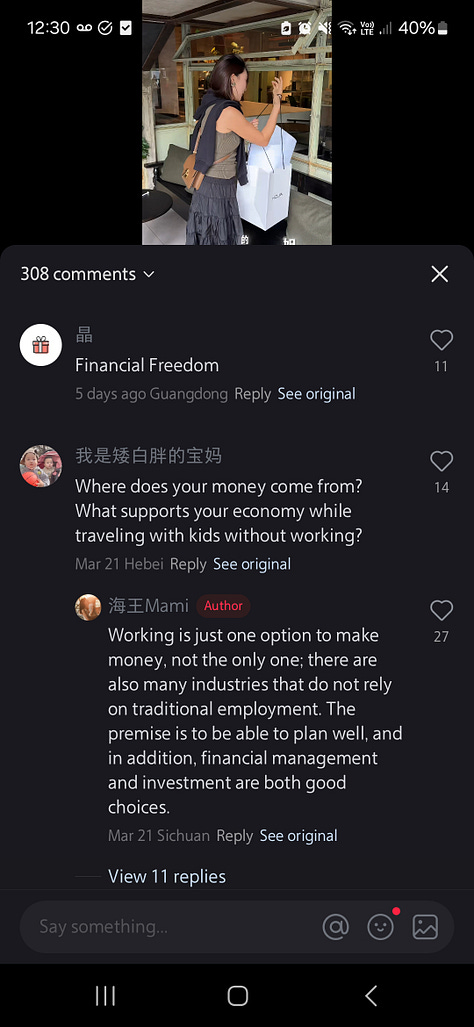
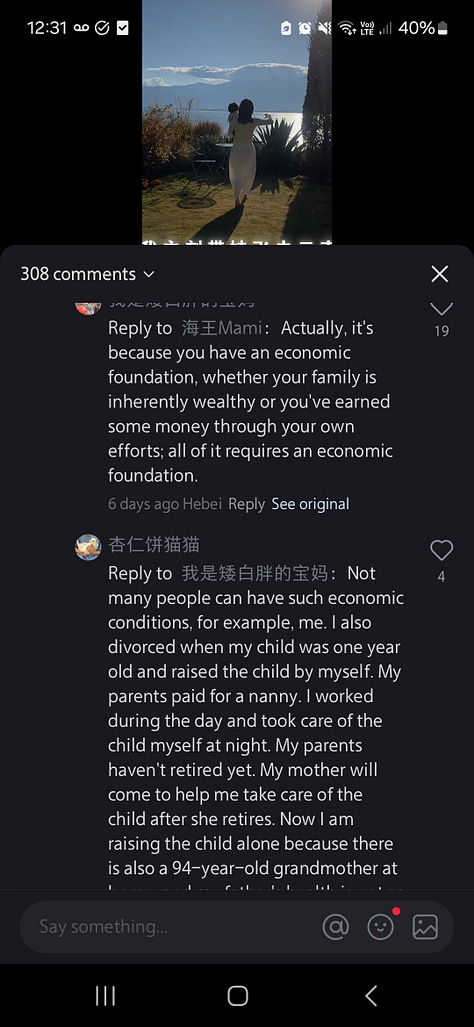

Taking all this into account, is promoting single motherhood something the CCP can realistically embrace on a mass scale? Is it just a trend, one that alienates more people than it brings onside? What are the drawbacks of promoting single mothers over the traditional family route? Firstly, there’s the danger of alienating even more men who feel left behind (rightly or wrongly) by the system, and used and abused by what they deem to be conniving women. Secondly, for all its innovation and technical advances, China is still a patriarchal and socially conservative society. This is the type of development that threatens to widen the gap between rich and poor, rural and urban, young and old, male and female.
But it’s also moving society forwards. Can the CCP afford to remain stuck in the past when the traditional social norms are the very thing that have brought your demographics to the brink of calamity? As one woman rather succinctly puts it: “The country is encouraging childbirth, why do you still set up obstacles for unmarried mothers?”
At the moment these remain at the level of interesting questions, but that doesn’t mean they can go unanswered forever. As more women choose not to get married in order to pursue careers and other sources of fulfillment without the burden of husbands and inlaws, they will become a demographic that will need to be taken seriously. Especially as they tend to be better educated, higher earning, and increasingly more demanding than their male counterparts.
Weird yet wonderful
I use the word ‘weird’ here not to cast aspersions, but more to imply that these women are unconventional, extraordinary even. Interestingly, in my research I found that the word weird used to have a different meaning:
In this sense the word is even more fitting. These women have shirked tradition and taken control of their destinies, despite personal, familial and societal misgivings. The fate of their children – and indeed the next generation of Chinese citizens – may well rest in their hands.
After spending a week with these women, I’ve come to admire many of them. Not because they inspire me to leave my wonderful husband (and I’m not just saying that because he’s the editor of this newsletter), but because they’re leaders of a new feminist generation, whether they know it or not. In many ways, they remind me of my mum: tenacious, bold, and above all loving. Though they’re often guilty of glossing over the hardships that many mothers face, they’ve embraced the ideal of motherhood and all the joys it can bring, and really that’s what young women need to hear. Being a mother is tough, but it’s also rewarding, and sometimes even fun.
Maybe if the CCP can embrace these women too, China will have some renewed hope for a future filled with happy families. Even if it’s not the families they were expecting.






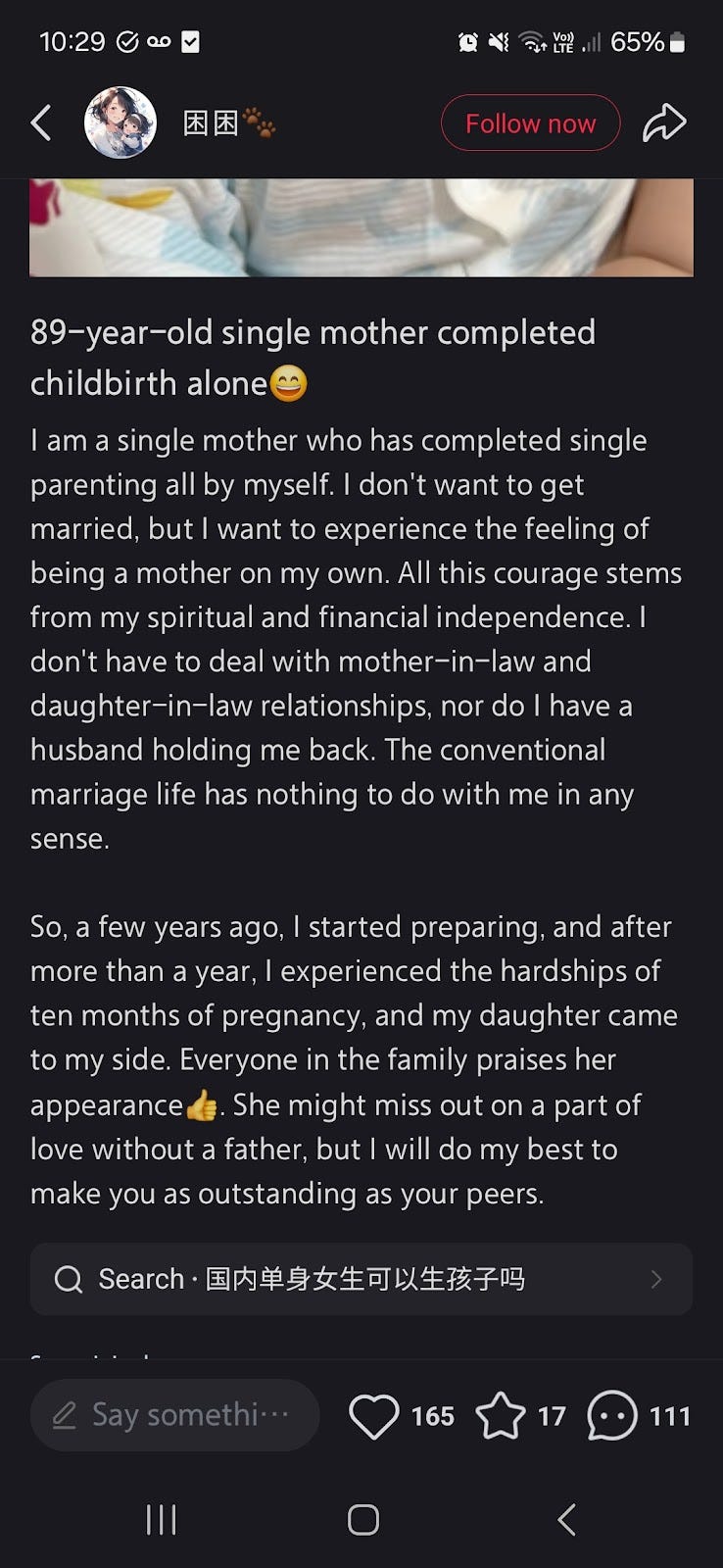
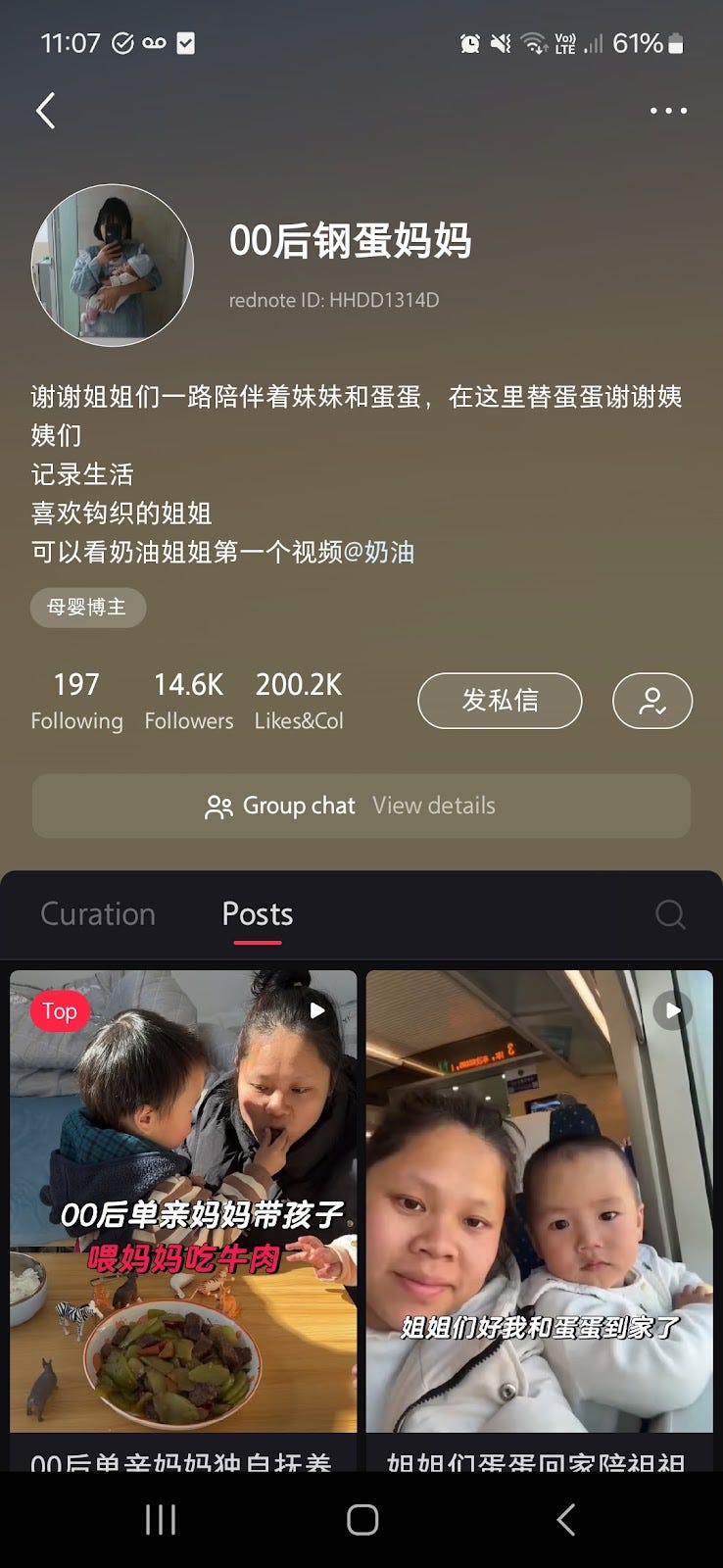

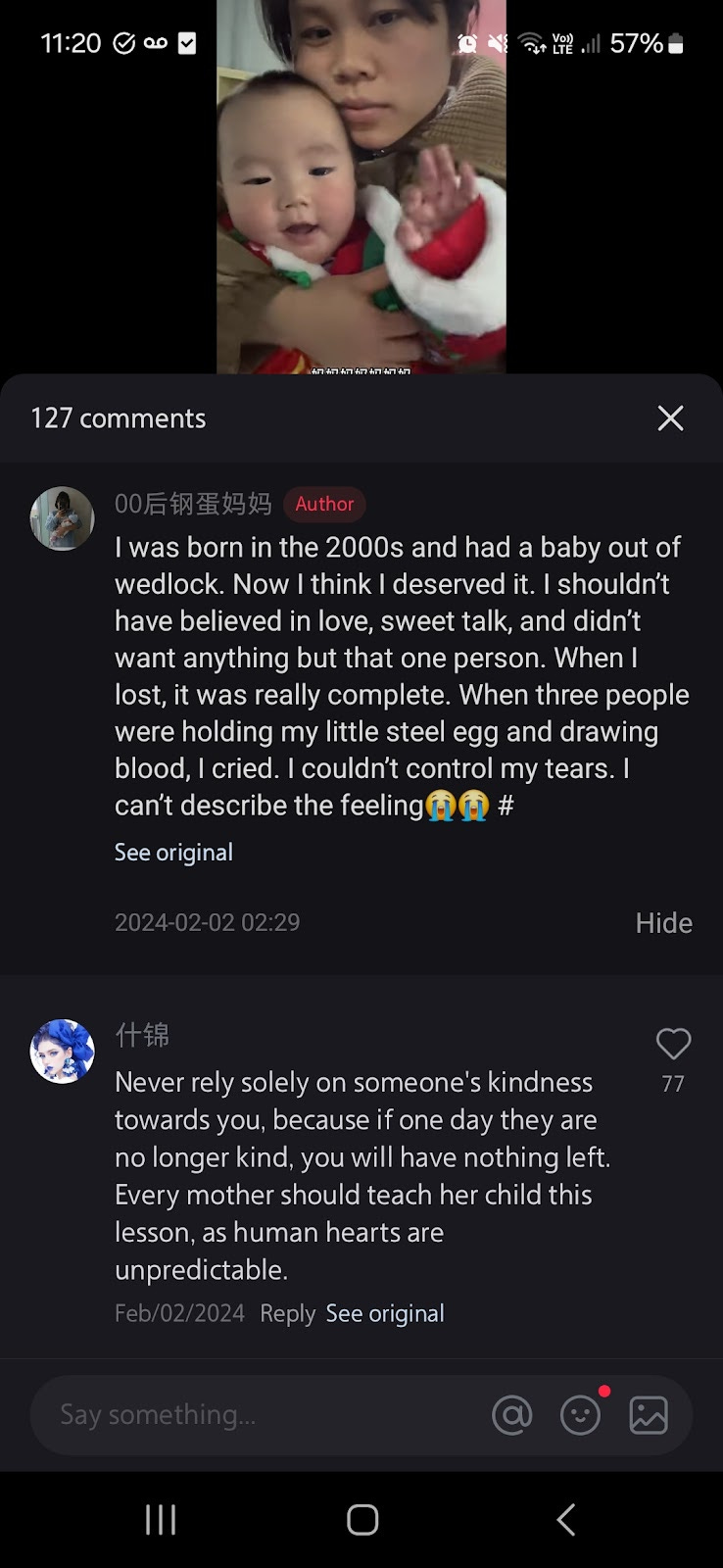

American guy, living in Wuhan... Yes, it's out there, but it's more internet meme than trend, and the meme is decidedly tilted toward high net worth individuals in high cost cities. The vast majority of single Moms I know are divorced because the guy found a younger woman, not because of wanting to be single Moms, although most are just fine with it.
Great article & happy Mother’s Day!